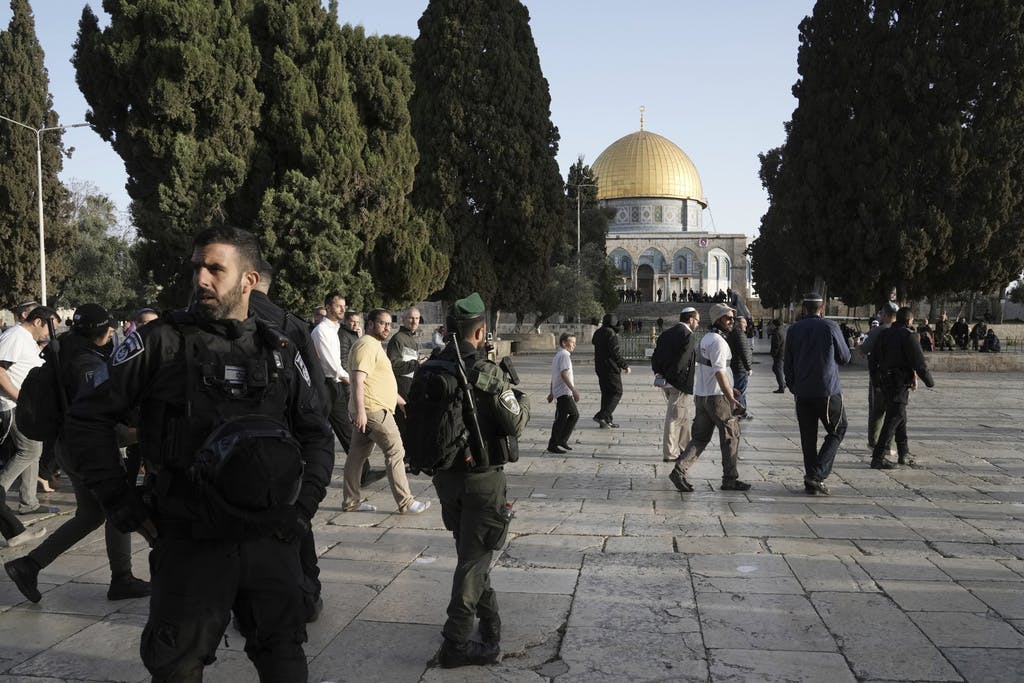After Latest Violence at Temple Mount, Will Washington Tell Jordan’s King To Cool It?
America would do well to remind Amman of the benefits of relations with Israel.

Washington can contribute to the cause of averting further violence at Jerusalem’s holy places of worship by telling Jordan’s King Abdullah to end unnecessary incitement surrounding the al-Aqsa mosque.
The king, who is the custodian of the mosques at the area known in Arabic as Haram a Sharif, is no voice for calm. Rather than responsibly lowering tensions as religious tempers flare, he too often exacerbates passions with provocative statements, as he did this week.
The area Muslims call Haram al Sharif was mostly calm during the first two weeks of the month-long Ramadan worship period. Then, violence erupted on Wednesday morning inside Islam’s third holiest site: 350 young men, armed with firecrackers, stones, and boulders, barricaded themselves inside the al Aqsa mosque. They seemed ready for a fight.
Attempting to prevent desecration of the site, Israeli police called on the men to leave the mosque peacefully. Officials said they feared interruption of pre-dawn Muslim prayers and possible attack on non-Muslim visitors to the site. As the men inside refused to leave, police broke into the mosque and, following skirmishes, arrested all 350 men.
Video clips of the eviction process, including police beating some of the men with bats, went viral across the Arab world. Hamas reacted with a barrage of rockets from Gaza and one hit a building inside Israel. The Israeli Air Force responded with hits on Gaza targets.
By daylight, calm had returned, both to Gaza and to Jerusalem’s holy sites. Yet, as Israeli Jews sit for the Passover Seder, Wednesday’s incidents raised tensions across the region. Fearing additional violence, Israeli security forces raised their alert to top levels.
This ritual happens every year, Jerusalem’s deputy mayor, Fleur Hassan-Nahoum, told the BBC. Asked if police reaction was appropriate, she said, “It’s very difficult to say what’s appropriate when you’re facing hooligans throwing three-kilo boulders at your head, firecrackers, and desecrating their own holy site.”
Ms. Fleur-Nahoum added that while on the previous Friday 150,000 worshippers prayed peacefully at the mosque, the young men posed a threat to freedom of worship. “This doesn’t come out of thin air,” she said. “This is a curated event that is weeks in the making, of incitement” to violence.
In the leadup to Ramadan, Passover, and Easter, calls to “defend” the holy mosques were prevalent in the Palestinian press. The news that a small number of extremist Jews planned to sacrifice a goat on the Temple Mount during the Jewish holiday fed passions — even as rabbis ruled that the ancient ritual is forbidden on the mount, and though police arrested the few who planned to defy the ban.
Defying expectation for violence, prayers at Jerusalem’s holy sites since the start of Ramadan, on March 22, went on with no incident until Wednesday.
So why would the Hashemite king, a close ally of America and Israel, issue a call to “defend” the mosque even before violence erupted? Why was his language so similar to that of Hamas agitators and other Iran-funded terrorist groups?
“King Abdullah stressed that it is the duty of every Muslim to deter Israeli escalations against Islamic and Christian holy sites in Jerusalem,” a royal statement issued Monday said, calling on “the international community” to intervene on behalf of Christians and Muslims.
Amman enjoys the fruits of the peace treaty Jordan signed with Israel in 1994. So does Israel. Beside security cooperation, which helps to secure the Hashemite palace in an often-restive Palestinian-majority country, Israel supplies much of Jordan’s energy and water needs.
Yet, “Every Ramadan, like clockwork, we see the Hashemite kingdom coming with vitriol” like this week’s statement, a Mideast watcher at the Foundation for Defense of Democracies, Jonathan Schanzer, tells the Sun.
Mr. Schanzer cites Israeli officials who highlight the benefits of a stable neighbor. Yet, he says, they are frustrated that while Amman officials praise the bilateral relations in private, their public anti-Israel statements contribute to rising tensions at sensitive times — especially on issues related to the holy mosques, where a Jordanian-appointed body, known as the Waqf, is the top religious authority.
In an essay for the FDD, Mr. Schanzer details the history of Jordanian relations with Israel and America. In Washington, he writes, officials “view Jordan as beyond reproach thanks to a prevailing view, based on Jordan’s geopolitical position, that it is ‘too weak to fail.’” Washington, he adds, “must change this paradigm.”
The Jordanian monarch’s father, King Hussein, started negotiating secretly with Israel as far back as 1963. He developed warm personal relations with the former Israeli premier, Yitzhak Rabin, with whom he signed the 1994 peace treaty. Unlike him, King Abdullah “appeared to harbor more overt distrust for Israel,” Mr. Schanzer writes.
On issues related to the Temple Mount, Jordan is too often the problem, rather than the solution. Beyond bromide state department statements calling on all sides to maintain calm, Washington would do well to remind Amman of the benefits of relations with Israel, and tell King Abdullah to cool his overly heated rhetoric.

